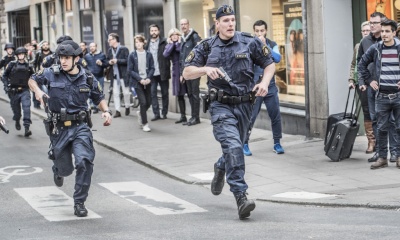Terrorism, Trust, and Inclusion
Date posted
Yesterday
The terroor attack in Stockholm on 7 April 2017 left 4 dead and several wounded. It may be a copycat crime (cf. what happened in London two weeks ago). At this point 6 persons have been taken into custody, all of them apparently from Uzbekistan. Information available about them is sparse. Whether they were involved, and if so why, is unclear as of this writing, and the police still refers to it as a "possible terror attack". As for us, the citizens, we are developing new means of reacting to and commenting upon such events, aimed at healing our wounds, at both individual and societal levels. The heaps of flowers and candles, the Eiffel Tower going black – these are examples of new global macro-level expressions of support, commentaries on, and contributions to a healing process.
Today
Experts say they have been waiting for this. Sweden – and Scandinavia in general – is not prepared for deliberate mass murder on this scale (just as Norway and its citizens were unprepared for the Utøya massacre in July 2011). Being at the receiving end of new and violent forms of expression in the public arenas we are fast losing our innocence. How could we possibly prepare for something that we do not know and expect; and that we cannot even conceive of being possible? For each such event we become more negative towards those around us, especially those that do not look and think like "us". Our societies become ever more conscious and suspicious of "the other". The hallmark of our societies, and the basis of how they function, namely TRUST, is decreasing with each such terrible event.
Tomorrow
It has become a commonplace for the authorities to tell us that we are safe to walk around in public spaces, but that we should be observant and vigilant regarding anything out of the ordinary. While this is a rational response, on the longer term it translates as an official certification of being suspicious about anything and anybody that we citizens find, well, suspicious. The immediate fall-out will be that right wing (read: populist) groups and political parties in Scandinavia will demand further tightening of control mechanisms. This will accomplish nothing but contributing to increased suspicion and decreased levels of trust.
It is becoming a brave new world, and I do not much like it. Against such negative sentiments, however, instead of despairing or turning away, we have to ask ourselves how we can address and counter these destructive tendencies, at macro- and micro-levels. How to address the growing fragmentation – in terms of culture, economics, politics, and belonging – in countries around the world? How to turn difference and seeming adversity into advantage? How to (re)build trust when and where it is being eroded? Is more police, control and authority the answer? Should we also/instead focus on transparency and inclusion? Is there a third way? Do we have to give up on the idea of integration? How about decentralization or devolution of power? Is the avowed goal of cultural pluralism possible, without at the same time fragmenting – not to mention destroying – the intricate tapestry of culture? Are values open to bargaining? If so, what are the stress-points beyond which deals cannot or should not be made, or, if made, will not work? How to assess the merits, as it were, of the majority or host cultural system and values against that of an immigrated minority? Are national majorities prepared to accept that there is not anymore one integrated knowledge, one that encompasses all citizens, but that there are multiple knowledges that compete. What does it mean to be a citizen of a country? Which are the minimum obligations that can meaningfully and realistically be combined with which maximum rights? What should we do? What CAN we do?
Lars T Soeftestad
Notes
1/ Image credit: Tomas Oneborg-SvD-TT - NTB scanpix.
2/ This article was published the day following the attack, when there were still more questions than answers available.
3/ The word "knowledge" does not have a plural form in English. Nonetheless, here it is used in its plural form. Accepting that knowledge should be understood as the complete whole of a culture, and given that there are several thousand separate, self-contained cultures in the world, it follows that there is more than one knowledge. The Devblog article "Anthropology and development cooperation" discusses how the term "knowledges" is relevant for, among others, understanding the difference between the terms "medical anthropology" and "health anthropology" (see Note 5).
4/ A revised version of this article, with the title "Stockholm yesterday - Scandinavia today: On trust and inclusion", was published on LinkedIn Pulse, 8 April 2017, URL: https://www.linkedin.com/pulse/stockholm-yesterday-scandinavia-today-tomorrow-trust-soeftestad?published=t
5/ Relevant Devblog articles: "Anthropology and Development Cooperation" at: https://devblog.no/en/article/anthropology-and-development-cooperation
6/ Permalink, URL: https://www.devblog.no/en/article/terrorism-trust-and-inclusion
7/ This article was published 8 April 2017. It was revised 5 January 2019.

Add new comment